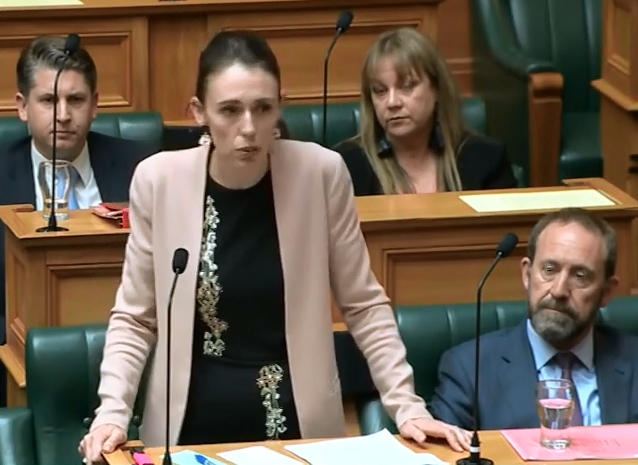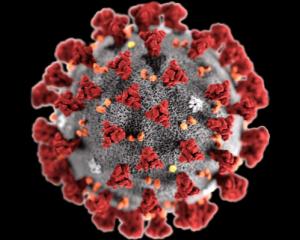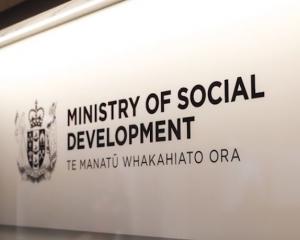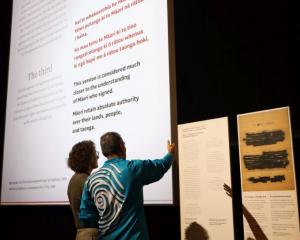Legislation liberalising abortions has overwhelmingly passed its first vote in Parliament.
A bill revising New Zealand's 42-year-old Contraception, Sterilisation and Abortion Act passed its first reading in the House 94 votes to 23 on Thursday.
Prime Minister Jacinda Ardern told Parliament the time has come to put women's dignity and rights at the centre of discussion.
There are 120 MPs in Parliament and all but three voted – including National MP Alfred Ngaro, who had strongly opposed abortion reforms.
The biggest change would see a current requirement for two doctors to have to approve an abortion on physical or mental health grounds dropped - in favour of letting women make the decision up to 20 weeks’ pregnancy.
Later than that, one medical practitioner would have to agree.
MPs voted on the bill individually, rather than along party lines. The legislation will now go to a Select Committee, which will consider changes and public submissions.
"How long a journey it would have felt for many inside and outside the House for this day."
The Prime Minister praised those who had worked to support abortion law reform, singling out former Labour MP Steve Chadwick for being a staunch supporter during Ardern's early years in Parliament.
"Why has it taken us so long? This is an issue that people feel deeply about, strongly about. Many hold personal views, many have personal experiences. In spite of those personal views, who am I, who is this House to determine anyone else's reproductive rights?"

"But I draw a line when holding that view impedes on the rights of others."
She also slammed the current law that meant many women had to lie to get an abortion.
"If they do tell the truth, then technically under our law, they are a criminal. And I don't believe that is right ... [but] why take my word for it? Enough of us have heard enough stories," she said.
The Prime Minister read out a message from one woman who said that everyone in the current abortion process was "lovely", but the process was anything but as she had to repeatedly justify her wish for an abortion when all she wanted was for it to be over.
She also noted Dame Margaret Sparrow, who said after her own 1956 abortion that she was a criminal and faced 7 years' jail if she had been charged.
Ardern said the time was right to debate the issue with dignity, with women's rights at the centre of the discussion. She finished by quoting correspondence from another woman, which said: "Give us our dignity back."
ANDREW LITTLE
Justice Minister Andrew Little bought the bill before the House for its first debate this afternoon. Speaking first, he warned the coming public debate about the laws would be emotive, often based on faith or deeply held beliefs that are deeply entrenched.
"We will hear extravagant language in the public debate referring to killing and murder. I reject those notions," Little said when introducing the bill.
He disagreed with opposition to abortion based on arguments of denial of life or a breach of human rights.
"I accept on legal and on moral grounds.. that human rights do not accrue until human life is possible. I accept the born alive principle that guides our courts today."
Little said the bill was about taking abortion out of a criminal justice framework, putting it into a health framework, and respecting a woman's right to choose and her ability to do so.
"It is wrong that in making that decision, a woman has to got through a set of processes that no other woman seeking medical procedures [has to] ... It is wrong that our present law characterises a decision a woman wishes to make as criminal."
JUDITH COLLINS
National MP Judith Collins said the bill was not pro-abortion, but a "reality check".
"We women have dealt with it for generations," she said.
Collins described growing up in Matamata and seeing young women who got pregnant being sent away to have children, adopting them out and then returning to marry the fathers.
"What in God's name was anyone thinking?" she said. "It also happened to girls who were sent away for an abortion, to Australia."
She also spoke of having a miscarriage while working on a trial as a lawyer.
"I had to go back the next day to finish the court case," she said.
MAUREEN PUGH
West Coat National list MP Maureen Pugh was the first to speak in opposition to the bill. She said wanted MPs not to "turn abortions into quasi-contraception on demand".
Abortion was in the Crimes Act to protect woman and that to date, no woman have been prosecuted under the current law," he said.
Instead of Parliament debating abortion reform, Pugh said a better use of MPs time would be to talk about increasing access to cheaper contraception.
By changing abortion laws, New Zealand risked changing the "social structure" of the country, she said.
"This is huge and rapid social change."
PAULA BENNETT
National Deputy Leader Paula Bennett received jeers from one person in Parliament's public gallery as she spoke about why she was supporting the first reading.
"A woman choosing not to carry out a pregnancy should not be a crime, in my opinion," she said.
She said there would be very few people in New Zealand who would not know someone who had been in a situation of an unwanted pregnancy.
Bennett spoke about the trauma that some woman felt when they were going through an abortion. It should be a health issue, not a criminal issue, she said.
"We should be supporting them [women] with legislation that does support them."
But any decision for a woman to carry out an abortion should be done with considerable thought.
She said more counselling should be made available for those to choose an abortion.
"In my mind, I do believe in a women's right to choose."
CHRIS PENK
National MP Chris Penk opposed the bill, saying that an unborn child has a beating heart, unique DNA, independent movement, and is capable of feeling pain.
"If the unborn child is merely a collection of cells, then we are all merely a collection of cells."
He said the bill had no protections against the coercion of the mother-to-be, no restrictions on the method of abortion, and no requirement to notify the parents for pregnant women under the age of 16.
He added there had never been a criminal conviction for getting an abortion under the current law.
TRACEY MARTIN
New Zealand First MP Tracey Martin said all nine New Zealand First MPs would be voting in favour of the bill in the first and second reading.
She was near tears at the start of her speech, speaking about someone she never knew called Beverly.
It was, however, a story for a different day, she said.
Martin said last week she had written a "very different" speech to the one she was giving today.
Instead, it was focused on the logistics of New Zealand First's position.
She said on Tuesday, the majority of NZ First's caucus voted that they wanted a referendum in the bill.
MP Darroch Ball will introduce a clause in the committee of the whole house – between the second and third reading – requesting any new law goes to a referendum.
Martin did not say what would happen if that clause fails.
Martin had been negotiating the bill with Justice Minister Andrew Little since December.
At no point since then had any one within NZ First raised the prospect of an abortion referendum, she said. But the caucus decided and "the majority prevails".
JAN LOGIE
Green MP Jan Logie said while all eight Green MPs were voting on the conscience, they would all be voting in support of the bill.
When the party launched a campaign five years ago to take abortion out of the Crimes Act, the most common reaction was surprise that it was still in there.
She said the abortion laws had not been updated since 1970s, a time when milk was delivered in bottles at the end of the drive, and when God Defend New Zealand became the national anthem alongside God Save the Queen.
"It was a time when the law supported a man's right to sex with his wife regardless of whether she wanted it or not."
Logie said polls at the time had shown that 60 per cent of people had wanted the leave abortion to be up to woman.
But the will of the people had been undermined by conservative forces in the House which had only four women at the time.
"In some ways this is really a long delayed catch-up to ensure our legislation finally reflects the dominant values of our society and the jurisprudence."
DAVID SEYMOUR
Act leader David Seymour supported the bill as a crucial step forward. But he said he preferred allowing a woman to make the choice to have an abortion in consultation with her health practitioner, rather than imposing an arbitrary 20-week rule.
He said opponents of the bill will happily cry out that they "love babies more and they are somehow more morally fit to have a view on this issue".
But the real issue is whether Parliament should support a legal prohibition on abortion, and prohibition was tantamount to saying that pregnant women can't be trusted with their decisions.
"It shouldn't take a great deal of thought to see how morally bankrupt that position is," Seymour said.
The bill was designed to remove the subterfuge that women employed to have an abortion under the current law, he said.
He added that the status quo also failed because services and options in major cities were very different to those in rural areas.
"Morally and practically, this bill is the right thing to do."
What next
The legislation - introduced on Monday - will now go to a special Select Committee to consider public submissions and changes.That could be the start of a heated debate, with lobby groups on both sides already weighing in.
Anti-abortion groups, such as Family First, have described the changes are “radical” and have promised to fight tooth-and-nail.
And several MPs, including National’s Chris Bishop, have in recent days been posting screenshots of their inboxes flooded with emails urging them to vote against the bill, some individuals calling them “Nazis” and “murderers”.
Late-term abortions
Critics such as National’s Chris Penk have argued the bill would effectively allow abortion up to birth. However, Justice Minister Andrew Little has called those claims “extremist”, saying of the about 13,000 abortions carried out last year, only 57 were after 20 weeks and none near full gestation.
Abortion Providers Group Aotearoa New Zealand - made up of doctors, nurses, midwives and social workers - also said late abortions were very rare.
“Late second and third trimester abortions are events where continuing a pregnancy may lead to significant risk to maternal life or a mother having to birth her baby knowing she will have to watch him or her die,” they said in a statement.
Meanwhile, advocates for reform, including the Abortion Law Reform Association of New Zealand and Family Planning, say while they’re pleased with change, they’re disappointed a test is being kept for abortions after 20 weeks.
They’ve promised to put in a number of proposals in front of the Select Committee.
Referendum
While the bill went through extensive consultation with NZ First before being unveiled, the party blindsided Little by saying it would call for a referendum this week.
Little said the issue had never been raised with him and the first mention came on Tuesday after a meeting of NZ First’s caucus.
NZ First leader Winston Peters on Thursday lashed out at Labour, saying it he that had been surprised, because the legislation was not in the Labour-New Zealand First coalition agreement.
Peters said it has long been his party’s policy to seek a public mandate on conscience issues and no one should have been caught out by the move.
What the bill changes
Currently, women need clearance from two doctors on grounds of mental or physical risk from day one to get an abortion. After 20 weeks an abortion currently needs to save the life of the woman.
About 98% of abortions are performed under the mental health clause.
The new law would mean there would be no legal test for earlier than 20 weeks, Any later and the person performing the procedure will have to “reasonably believe the abortion is appropriate with regard to the pregnant woman’s physical and mental health, and wellbeing”.
Medical practitioners who didn’t comply would face consequences from their medical bodies, rather than under the Crimes Act.
Other changes in the legislation include allowing for the introduction of 150-metre safe zones around clinics where people have been harassed and allowing women to self-refer to clinics.
It will still be illegal for an unqualified person to try to perform an abortion and causing the death of an unborn child by harming a pregnant woman will remain an offence.
Comments
what about the dignity of the unborn child /
Thanks for posting an extended article. Having a number of MPs refer to the fact no woman has been convicted of an abortion crime under the present law causes me to ponder. The idea that "abortion is under a law therefore possible criminality as a social stigma persists," wears thin as soon as it is expressed because one's feelings being hurt cannot be compared to the death of a child. Every abortion kills a living child.
I have three children and my wife could have gone for abortion on two of them because of serious threat to the mental health of the mother. She was brave, principled, honourable and loving and suffered for her children so as to bring them to birth.
The other thing is that if hurt to the feelings or some mental stress to the mother is an issue there seems to be before parliament a jackhammer to crack a small nut in this bill. It makes me think the legal angle is only an excuse to introduce freedom of access to abortion for every woman "on demand" as we used to say (up to 20 weeks or ½ the life of the child in the womb).
I commend the speakers who spoke so well and VOTED AGAINST the introduction of a seriously flawed bill.
Mental health, dignity and rights are going to be affected regardless of whether a mother aborts or keeps a pregnancy.
Human sacrifice is not good.











